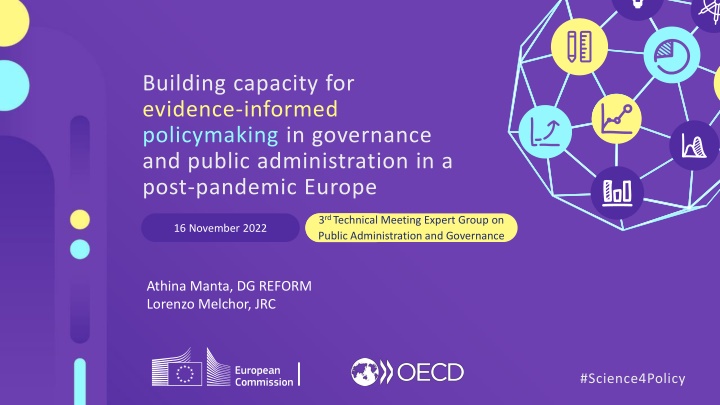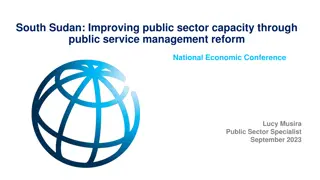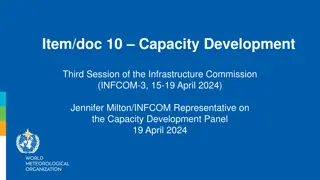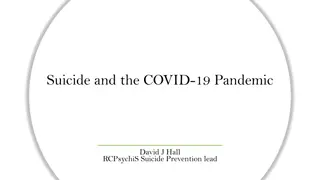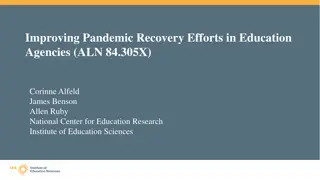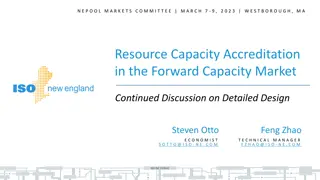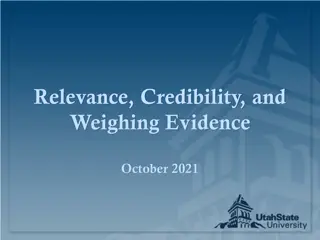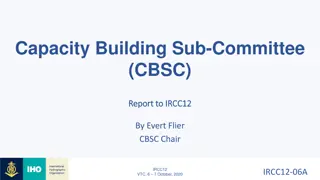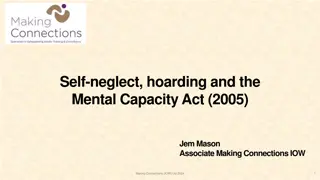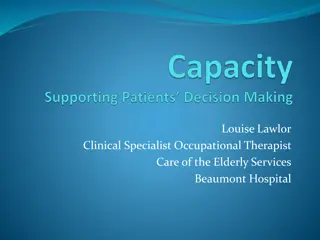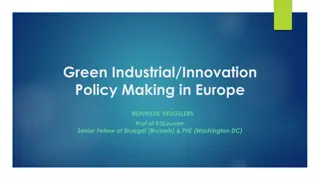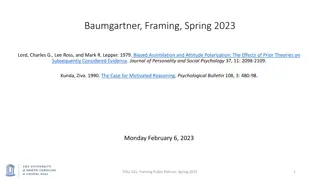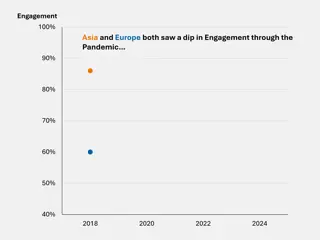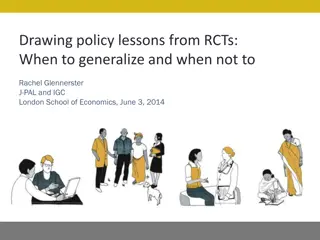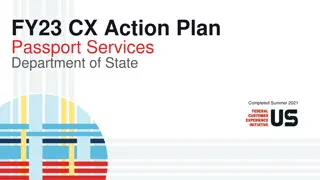Enhancing Evidence-Informed Policy Capacity for Post-Pandemic Europe
The project focuses on building capacity for evidence-informed policymaking in governance and public administration for a post-pandemic Europe. It aims to integrate evidence, science, and evaluation in policymaking to enhance institutional awareness and capacity. The multi-country initiative involves various governmental and research organizations to drive impactful reforms for better decision-making processes.
Download Presentation

Please find below an Image/Link to download the presentation.
The content on the website is provided AS IS for your information and personal use only. It may not be sold, licensed, or shared on other websites without obtaining consent from the author.If you encounter any issues during the download, it is possible that the publisher has removed the file from their server.
You are allowed to download the files provided on this website for personal or commercial use, subject to the condition that they are used lawfully. All files are the property of their respective owners.
The content on the website is provided AS IS for your information and personal use only. It may not be sold, licensed, or shared on other websites without obtaining consent from the author.
E N D
Presentation Transcript
Building capacity for evidence-informed policymaking in governance and public administration in a post-pandemic Europe 3rd Technical Meeting Expert Group on Public Administration and Governance 16 November 2022 Athina Manta, DG REFORM Lorenzo Melchor, JRC #Science4Policy #Science4Policy 1
What is it? The largest multi-country public administration reform project by Technical Support Instrument A 2-year project implemented by the JRC and the OECD Seven Member States Centres of Government, Budget ministries and Fiscal councils, Strategic decision making centres, science academic education and innovation systems organisations #Science4Policy 2
Objectives Better institutional integration of the use of evidence, science, and evaluation in policymaking Improved capacity and awareness for evidence- informed policymaking in governance and public administration in a post-pandemic Europe #Science4Policy 3
Project governance framework Project advisory group JOINT RESEARCH CENTRE (JRC) DG REFORM General Secretariat of Coordination of the Presidency of the Government of the Hellenic Republic The Federal Public Service Policy and Support (BOSA) Government of the Czech Republic (VLADA) Government Strategic Analysis Centre of the Government of Lithuania (STRATA) Ministry of the Interior and Kingdom Relations (DZK) of the Dutch Central Government Estonian Research Council (ETAG) Ministry of Science and Education of the Government of Latvia General Secretariat of Fiscal Policy BELSPO Ministry of the Interior Ministry of Education and Research Cross-Sectoral Coordination Centre Office of the Government Netherlands Scientific Council for Government Policy (WRR) National coordinating groups Statbel Council of Economic Experts (SOE) Ministry for Regional Development State chancellery Research Council of Lithuania Intercabinet Working Group Government Office Chief Science Officers Interdepartmental network Centre of Planning and Economic Research (KEPE) Estonian Academy of Sciences Federal Planning Bureau Ministry of Industry and Trade National Centre for Social Research (EKKE) KUL-Instituut voor de overhead Minister for Science Research and Innovation Office UCL Louivain National Centre for Scientific Research Demokritos Research, Innovation and Development Council Technology Agency of the Czech Republic #Science4Policy 4
Project overview Outcome A. Improved capacity for EIPM Outcome B. Increased awareness, recognition, and understanding Diagnostic reports Capacity-building workshops Thematic symposia Needs assessment Country roadmaps Policy recommendations for reform of policy making and science systems International mutual learning and exchange Better analytical and strategic competences #Science4Policy Joint declaration on science for policy by the seven participating Member States 5
Country national assessments Diagnostics, needs assessment, and country roadmap reports Analysis of beneficiary organisations in the wider public administration and governance ecosystem Linking with existing political priorities and ongoing reforms Methodology: Desk-research, surveys, interviews, focus groups, participatory workshops, etc. Supported by JRC staff/groups of national experts (JRC) and OECD staff/Peer Review methodology (OECD) A common analytical framework developed by JRC and OECD and adapted to local circumstances #Science4Policy 6
Draft of the analytical framework ANALYTICAL LEVEL AND EVIDENCE SUPPLY OF SCIENCE DEMAND OF SCIENCE AND EVIDENCE WHERE SUPPLY AND DEMAND MEET Professional and team competences Incentives to engage in science for policy Career profiles, mobility programmes and challenges Individual Role of civil service in policymaking Resources and staff suitable for evidence-informed policymaking Policies/processes on domestic core public policy (Better regulation, RIA, budgets, foresight, impact of green transition, knowledge valorisation, etc.) Mandates & missions Dedicated structures, processes & support for science for policy Organisational Inter-institutional coordination (e.g. knowledge sharing mechanisms) Boundary organisations and actors to engage with scientific community and knowledge Coordination mechanisms & boundary organisations for policy engagement Role and functions of scientific councils, academies, etc. Policies/processes influence by European commitments and processes (Structural Funds, Green and Digital Transition, RRP, HE, ERA, etc.) Inter- organisational Policies on research assessment, inter-sectoral mobility, research funding, etc. promoting EIPM-culture and values Policies/processes/norms promoting EIPM-culture and values, public trust, and processes between branches of public administration System #Science4Policy 7
International capacity-building workshops Scientists Policymakers Knowledge brokers Aim: enabling trainees to deliver similar exercises nationally to help scientists maximise their policy impact Aim: building capacity in policymakers for EIPM and ensuring follow-up trainings Aim: address challenges in science for policy and in setting up knowledge mobilisation units Number of trainees to be decided 3 online/in-person workshops 1 online/in-person workshop 48 participants in total (pairs of scientists-facilitators) 2 online/in-person workshops Using JRC s competence framework and OECD work on Building Capacity for EIPM and peer learning Number of trainees to be decided 3 pairs per country (6 people) With the input of experts and practitioners from other organisations Training of trainers format Around Q2-Q4 2023 Around Q3 2023 Q2 2024 Around Q1-Q3 2024 Delivered by the JRC JRC and OECD JRC and OECD #Science4Policy 8
Mutual learning exercises via thematic symposia Opportunity for networking and international exchange of practices A total of 3 international thematic symposia (online or in-person) To be held between April-July 2023, Oct 2023-Jan 2024, and April-July 2024 Topics to be yet decided: Long-term impact of COVID-19 and institutional structural changes Evidence and crisis management Strategic foresight and anticipatory governance Behavioural insights and its organisation in public administrations Public governance, deliberative democracy, values and identities AI and data analysis in public governance Policy evaluation in public administration Other topics: implications of war in Ukraine, adapting to challenging times, etc. #Science4Policy 9
Project kick-off meeting #Science4Policy 10
Next step: National kick-off meetings Greece: early December Belgium: mid January(?) Estonia: 23-27 January Latvia: in February (?) Lithuania: in February(?) Netherlands: in January-February (?) Czechia: in early March (?) #Science4Policy 11
Thank you DG Reform Athina.MANTA@ec.europa.eu Joint Research Centre (JRC) Lorenzo.Melchor-Fernandez@ec.europa.eu Kristian.Krieger@ec.europa.eu OECD Stephane.Jacobzone@oecd.org Claire.Salama@oecd.org #Science4Policy #Science4Policy 12
